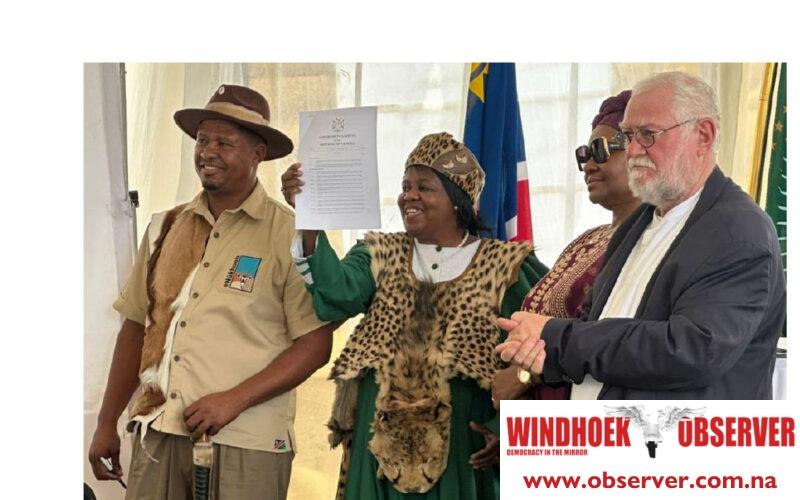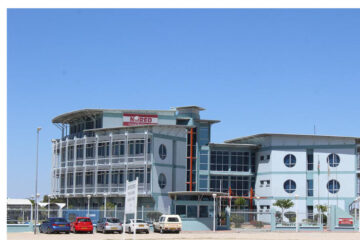Niël Terblanché
Namibia has achieved a new historic milestone in addressing past land disparities with the establishment of the first communal land in the Khomas Region.
The Minister of Agriculture, Water and Land Reform, Calle Schlettwein, officially handed over 8 132 hectares of land to the !Khomanin Traditional Authority on a historic day for the community and the nation.
Schwlettwein said that the land, which comprises the farms Groot Korasieplaats and Portion 1 of Groot Korasieplaats, was acquired by the government at a cost of N$33.9 million.
“Today, I am a happy man. It is an emotional moment because we have lived to witness the creation of the Khomanin Communal Land. This tenure set-up has changed forever, and your demands have at least in part been fulfilled,” he said.
He added that the handover marks the culmination of decades of efforts by the !Khomanin community to reclaim communal land.
The minister said that their struggle began in 1990, when they demonstrated in front of the gates of the Dean Viljoen National Game Reserve, demanding access to land.
Minister Schlettwein acknowledged the patience and maturity demonstrated by the !Khomanin Traditional Authority throughout the process.
Schlettwein added that the establishment of communal land in Khomas is part of the government’s broader commitment to addressing the inequities left by colonial regimes.
“The colonial regimes left us with serious inequalities in land ownership and economic opportunities. Dispossession, displacement, and deprivation of livelihoods left deep scars in black communities,” he said.
The minister reiterated the government’s dedication to implementing resolutions from the Second National Land Conference, which include expanding communal land and making it attractive for investment and agricultural development.
According to Schelettwein, the land will be administered under the Communal Land Reform Act of 2002, with the !Khomanin Traditional Authority serves as the primary allocator.
He added that the Khomas Communal Land Board, which is in the process of being appointed, and the Ministry of Agriculture, Water and Land Reform will oversee the issuance of land rights.
Schlettwein stressed the need for orderly and sustainable land use, warning against illegal fencing, overgrazing, and mismanagement.
“This is a great start for the !Khomanin Traditional Authority to practice its traditional rituals and customs, strengthen its disenfranchised traditions, and teach our children about agriculture and self-sustainability,” Schlettwein said.
He, however, acknowledged the challenges posed by the limited size of the land and called on neighbouring farm owners to offer additional land for expansion.
“We have a strong reservation against foreign nationals being allocated customary land rights. Land must be preserved for the present and future generations, with foreigners encouraged to lease land for economic activities,” he noted.
Schlettwein thanked the !Khomanin Traditional Authority and the government leaders whose efforts made the creation of the Khomas communal land a reality.
“The establishment of communal land in the Khomas Region is a breakthrough. Let us use this land resource productively and sustainably to derive decent livelihoods,” he said.
He added that the creation of communal land is a demonstration of the country’s commitment to redressing historical injustices and promoting inclusive development, ensuring that the land serves as a source of dignity and opportunity for all.
The leadership of the /Khomanin Traditional Authority expressed their gratitude for the communal land they received from the Namibian government.
The three leaders of the traditional authority, that spoke at the handover ceremony, also asked for more land that would enable them to create more economic activities.




